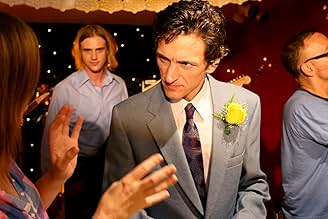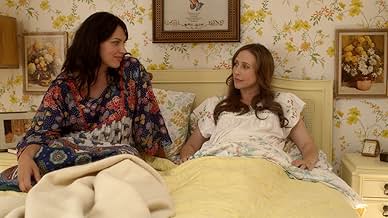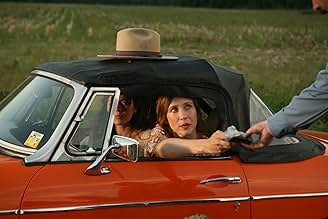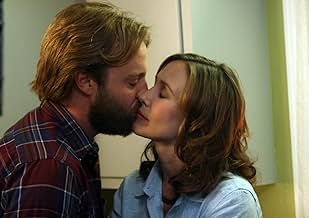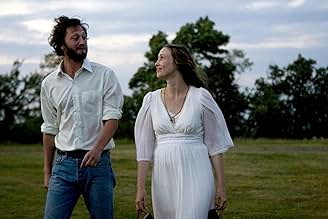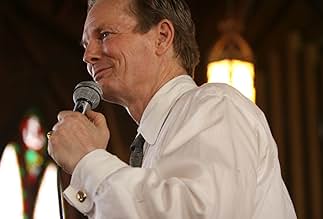PUNTUACIÓN EN IMDb
6,2/10
3,4 mil
TU PUNTUACIÓN
Añade un argumento en tu idiomaA chronicle of one woman's lifelong struggle with her faith.A chronicle of one woman's lifelong struggle with her faith.A chronicle of one woman's lifelong struggle with her faith.
- Dirección
- Guión
- Reparto principal
- Premios
- 1 premio y 7 nominaciones en total
Reseñas destacadas
Congratulations to Ms. Farmiga on such an excellent debut as a director.
As a completely involved in church evangelical Christian, it was exciting to see major elements of my lifestyle portrayed accurately on screen for a change. This film takes a kind and thoughtful middle road, not portraying the Christian life at extremes as it so often is- both negatively in many mainstream films and over the top positive in Christian films.
I wish I could send an email to all my church friends telling them to go see this film. But, as the film intimates, there are social and cultural taboos present within Christian churches. Some of the dialog and a few of the images would be so offensive to a small minority of my Christian friends that I would not dare to broadcast a recommendation but rather discreetly recommend it to those who would not be offended.
And a sizable segment of the really committed Christian population does not attend (at least in public) any R rated movie. This movie looks like it could have easily been brought to the screen as a PG-13 and reached a much wider audience.
And I hope this can reach as wide an audience as possible both for its portrayal of the Christian lifestyle and so we get to see more films from Vera Farmiga.
As a completely involved in church evangelical Christian, it was exciting to see major elements of my lifestyle portrayed accurately on screen for a change. This film takes a kind and thoughtful middle road, not portraying the Christian life at extremes as it so often is- both negatively in many mainstream films and over the top positive in Christian films.
I wish I could send an email to all my church friends telling them to go see this film. But, as the film intimates, there are social and cultural taboos present within Christian churches. Some of the dialog and a few of the images would be so offensive to a small minority of my Christian friends that I would not dare to broadcast a recommendation but rather discreetly recommend it to those who would not be offended.
And a sizable segment of the really committed Christian population does not attend (at least in public) any R rated movie. This movie looks like it could have easily been brought to the screen as a PG-13 and reached a much wider audience.
And I hope this can reach as wide an audience as possible both for its portrayal of the Christian lifestyle and so we get to see more films from Vera Farmiga.
Higher ground is one the finest films on its subject ever made, as well as one of the best films this year. Surprisingly, it's the directorial debut of one of our finest actors, Vera Farmiga. She's been very good in every film in which she's played any role, but is probably best known for her Oscar nominated turn in Jason Reitman's Up in the Air, opposite George Clooney. But for her own film, Farmiga has chosen a very difficult subject – one woman's struggle with her faith; her tenuous relationship with her husband inside a strictly defined religious community; and most important, her personal relationship with God.
The story covers the three-decade spiritual journey (late '50s through '70s) of Corinne, played as a little girl by McKensie Turner, as a teenager by Farmiga's younger sister, Taissa, and as a grown woman by Farmiga herself, in a performance that is brave, nuanced, and emotionally powerful. Hollywood films on this subject can either preach to the choir or have a contemptuous agenda, but Farmiga's film isn't about whether this or that religion is good or bad. It's about faith, and doubt, and finding one's way in life. In fact, this is the best work on the subject since Meryl Streep dazzled us in "Doubt." Here's how it goes: As a little girl, Corinne's pastor shows her how to invite Jesus into her heart, an idea that appeals to her since her home life is marred by a drunken father (John Hawkes) and a mother who has eyes for other men (Donna Murphy). But Corinne doesn't quite know what she's supposed to feel. She does like animals, and she also gives an accordion a try, when a door-to-door salesman pitches one to the family. Corinne's mother says, "She's not musical," to which the salesman quickly replies, "Maybe she hasn't found her instrument yet." This foreshadows Corrine's struggle to find her path to God.
Corinne is intellectually curious and has a talent for writing, and when a young guitarist asks her to write a song with him, she finds herself doing what so many teenagers have done before, and then pregnancy and a wedding follow. Corinne must then put her dreams of a writing career on hold, as she cares for the baby while her husband plays in a rock band. But a near tragic experience convinces them they need to give up this reckless life and join an evangelical Christian church. Corinne wants very badly to feel the Spirit, and to be happy with her husband in this religious community, but she doesn't feel what her pastor preaches, nor what she sees other members feeling. This is both a puzzlement and a torment to her, especially when she makes a good friend, Annika, played wonderfully by Dagmara Dominczyk, to whom loving and feeling God come easily.
This particular Christian community will be one many people recognize; they adhere to the bible's word and are happy to follow a strict patriarchal discipline. As a director, Farmiga does not judge, but those who do not subscribe to this type of religious practice may, and that would be a mistake. These are not bad people, they have chosen a life that works for them; it just may not be a good fit for Corinne. She's smart, studies the bible along with many other books, and she feels she has something valuable to share with the congregation. But when she speaks up, she's admonished by the pastor's wife for "coming very close to preaching and attempting to teach the men." She chafes under this restraint, which seems unreasonable to her. And then a second, very real, tragedy strikes, turning her struggle into a spiritual crisis. I think many people will recognize precisely this experience from their own lives: it is very real.
Farmiga's film does not hurry, the story unfolds slowly, and it also contains a fair amount of humor. I could've died laughing during a scene in which Corinne's marriage counselor tells her about "a dire MacMuffin moment," but it was no laughing matter. There are also many small everyday family scenes that may not seem of much consequence, but every piece of the story is important, so watch and listen carefully, as everything builds to one of the most emotionally powerful endings of any film this year. At the climax, Corinne speaks to the congregation, from her heart, a heart that perhaps gives too much, and also with a mind trying very hard to make sense of what it means to walk "The Higher Ground." In the end, we get a sense that Corinne will find her instrument, and that she will go on to make music with God.
Higher Ground is an excellent film and a brilliant directorial debut by Vera Farmiga, from whom I think we can expect great things in the future. I highly recommend it to all who appreciate literary quality stories that deal honestly with human feelings and relationships.
The story covers the three-decade spiritual journey (late '50s through '70s) of Corinne, played as a little girl by McKensie Turner, as a teenager by Farmiga's younger sister, Taissa, and as a grown woman by Farmiga herself, in a performance that is brave, nuanced, and emotionally powerful. Hollywood films on this subject can either preach to the choir or have a contemptuous agenda, but Farmiga's film isn't about whether this or that religion is good or bad. It's about faith, and doubt, and finding one's way in life. In fact, this is the best work on the subject since Meryl Streep dazzled us in "Doubt." Here's how it goes: As a little girl, Corinne's pastor shows her how to invite Jesus into her heart, an idea that appeals to her since her home life is marred by a drunken father (John Hawkes) and a mother who has eyes for other men (Donna Murphy). But Corinne doesn't quite know what she's supposed to feel. She does like animals, and she also gives an accordion a try, when a door-to-door salesman pitches one to the family. Corinne's mother says, "She's not musical," to which the salesman quickly replies, "Maybe she hasn't found her instrument yet." This foreshadows Corrine's struggle to find her path to God.
Corinne is intellectually curious and has a talent for writing, and when a young guitarist asks her to write a song with him, she finds herself doing what so many teenagers have done before, and then pregnancy and a wedding follow. Corinne must then put her dreams of a writing career on hold, as she cares for the baby while her husband plays in a rock band. But a near tragic experience convinces them they need to give up this reckless life and join an evangelical Christian church. Corinne wants very badly to feel the Spirit, and to be happy with her husband in this religious community, but she doesn't feel what her pastor preaches, nor what she sees other members feeling. This is both a puzzlement and a torment to her, especially when she makes a good friend, Annika, played wonderfully by Dagmara Dominczyk, to whom loving and feeling God come easily.
This particular Christian community will be one many people recognize; they adhere to the bible's word and are happy to follow a strict patriarchal discipline. As a director, Farmiga does not judge, but those who do not subscribe to this type of religious practice may, and that would be a mistake. These are not bad people, they have chosen a life that works for them; it just may not be a good fit for Corinne. She's smart, studies the bible along with many other books, and she feels she has something valuable to share with the congregation. But when she speaks up, she's admonished by the pastor's wife for "coming very close to preaching and attempting to teach the men." She chafes under this restraint, which seems unreasonable to her. And then a second, very real, tragedy strikes, turning her struggle into a spiritual crisis. I think many people will recognize precisely this experience from their own lives: it is very real.
Farmiga's film does not hurry, the story unfolds slowly, and it also contains a fair amount of humor. I could've died laughing during a scene in which Corinne's marriage counselor tells her about "a dire MacMuffin moment," but it was no laughing matter. There are also many small everyday family scenes that may not seem of much consequence, but every piece of the story is important, so watch and listen carefully, as everything builds to one of the most emotionally powerful endings of any film this year. At the climax, Corinne speaks to the congregation, from her heart, a heart that perhaps gives too much, and also with a mind trying very hard to make sense of what it means to walk "The Higher Ground." In the end, we get a sense that Corinne will find her instrument, and that she will go on to make music with God.
Higher Ground is an excellent film and a brilliant directorial debut by Vera Farmiga, from whom I think we can expect great things in the future. I highly recommend it to all who appreciate literary quality stories that deal honestly with human feelings and relationships.
Higher Ground is a beautiful and stirring tale based on a personal memoir about a woman who, after growing up in a Christian church, starts asking questions about what she's been taught. She delicately steps around the admonition not to preach to men, quietly disobeys the order against exploring her spirituality, and finally, at a turning point, learns that it is OK to be sad and angry at God, that she does not have to sing "It Is Well With My Soul" when it honestly isn't.
Though the film's critique of the church is firm and sharp in many places, its observations are fair, loving, and certainly earned. Besides being a thoroughly enjoyable film to watch, Higher Ground is an excellent starting point for dialog. Those who are other than Christian, even perhaps those who dislike Christians, may be able to put voice to their concerns in a new way, and can maybe be led to see that most Christians are honestly just trying to be the best they can be. Christians can take the critique as a mirror to hold up to their own congregations, looking for areas where perhaps they are inadvertently hurting others or themselves. To those inside the church, I would suggest that this film is a God-given opportunity to examine yourselves, to open your eyes enough to realize that the church is not infallible, and perhaps take the prompting to apologize for areas in which you and the church have failed to represent Christ accurately.
Religious or not, whether you seek dialog or just pure entertainment, Higher Ground is an excellent choice. It is worth every minute, a fun way of looking at a serious topic, and it will always stand out in my mind as an exceptional piece of art.
Though the film's critique of the church is firm and sharp in many places, its observations are fair, loving, and certainly earned. Besides being a thoroughly enjoyable film to watch, Higher Ground is an excellent starting point for dialog. Those who are other than Christian, even perhaps those who dislike Christians, may be able to put voice to their concerns in a new way, and can maybe be led to see that most Christians are honestly just trying to be the best they can be. Christians can take the critique as a mirror to hold up to their own congregations, looking for areas where perhaps they are inadvertently hurting others or themselves. To those inside the church, I would suggest that this film is a God-given opportunity to examine yourselves, to open your eyes enough to realize that the church is not infallible, and perhaps take the prompting to apologize for areas in which you and the church have failed to represent Christ accurately.
Religious or not, whether you seek dialog or just pure entertainment, Higher Ground is an excellent choice. It is worth every minute, a fun way of looking at a serious topic, and it will always stand out in my mind as an exceptional piece of art.
A lot of folks are posting to point out that HG is just plain boring. I say it's not.
What it is, is mundane. Farmiga set herself a difficult hurdle. She decided that she wanted to set this odyssey in the context of the life of, really, an ordinary woman. And so there's a notable wash of the quotidian over the whole movie; lots of pastels and a paucity of striking drama and color. Who buys a ticket to eat oatmeal? Well, there are a couple of redemptive factors, esthetically speaking.
One thing she does is place flashpoint moments of pretty intense drama, such as when the personality conflict with her husband culminates in violence; a real white-knuckler! And, that being merely a notable punctuation point in the action, a careful tracking shows the flick to be a kind of moderated exposition, ranging from the truly mundane to some pretty challenging stuff; and everything in between and every which way.
HG is an invitation to lovingly and thoughtfully consider those of our brethren who have addressed their existential crises by buying into this particular "out"; socializing themselves into fundamentalism.
Interestingly, the eye of the camera viewing this epic could be the fairly dispassionate eye of a deistic god: For example, I found the scene where our heroine meets with a "prophetic" councilor particularly challenging. It requires that we get off our duffs, roll up our sleeves, and personally address the issue: From whence do persons who promote themselves as social arbiters derive their credentials? Does his firm, unblinking claim to divine calling overrule the intuitions of women who simply feel unfulfilled? HG is, I think, carefully directed to leave you to answer this, and other questions, in the tabernacle of your own heart. This will naturally put off some moviegoers who never really felt that this was the purpose of film.
I'm not kidding: I'm fully aware that this style of filmmaking puts off plenty of people. Farmiga didn't make this film to be popular: She made it to be honest with herself.
And perhaps that's the foundation point of the best recommendation for this flick: How often do you get to see films like that?
What it is, is mundane. Farmiga set herself a difficult hurdle. She decided that she wanted to set this odyssey in the context of the life of, really, an ordinary woman. And so there's a notable wash of the quotidian over the whole movie; lots of pastels and a paucity of striking drama and color. Who buys a ticket to eat oatmeal? Well, there are a couple of redemptive factors, esthetically speaking.
One thing she does is place flashpoint moments of pretty intense drama, such as when the personality conflict with her husband culminates in violence; a real white-knuckler! And, that being merely a notable punctuation point in the action, a careful tracking shows the flick to be a kind of moderated exposition, ranging from the truly mundane to some pretty challenging stuff; and everything in between and every which way.
HG is an invitation to lovingly and thoughtfully consider those of our brethren who have addressed their existential crises by buying into this particular "out"; socializing themselves into fundamentalism.
Interestingly, the eye of the camera viewing this epic could be the fairly dispassionate eye of a deistic god: For example, I found the scene where our heroine meets with a "prophetic" councilor particularly challenging. It requires that we get off our duffs, roll up our sleeves, and personally address the issue: From whence do persons who promote themselves as social arbiters derive their credentials? Does his firm, unblinking claim to divine calling overrule the intuitions of women who simply feel unfulfilled? HG is, I think, carefully directed to leave you to answer this, and other questions, in the tabernacle of your own heart. This will naturally put off some moviegoers who never really felt that this was the purpose of film.
I'm not kidding: I'm fully aware that this style of filmmaking puts off plenty of people. Farmiga didn't make this film to be popular: She made it to be honest with herself.
And perhaps that's the foundation point of the best recommendation for this flick: How often do you get to see films like that?
I am a Christian who have had some experience with the kind of community this movie portrays, and while watching this film, I think this is something for Christian community to watch and think about it. I don't think the film attack the faith or the religion, but it make us question whether all the singing, ceremony, bible reading, church activities,that we do everyday matter at all if there is no "Love and Honesty" in them. Doesn't the Lord tell us that nothing mater if it's not done with love? Doesn't the Bible tell us that you shouldn't come to my altar if you haven't reconcile with your brother? Doesn't God tell us not to judge others? Through her life, Corinne's growing and losing of faith reflect that even honest doubt is still better than pretending to have faith, better than faith with a narrow-mind, faith that is blind to see one's own fault,or faith that judges other people to go to Hell. How many times, after we sing and praise the Lord, and read the Bible, we go home and then hurt those people in our family? How many times we doubt but don't dare to admit to others because we want to be accepted in the community? I think watching this film and discussing about it with an open mind can help Christian community view themselves more honestly. If you watch the whole films, you will find that the moment that reflect "God" the most are the ones when the characters truly love,care,and accept one another, not the scene where praise song are sung or clever words are spoken. The most beautiful things in the movie was the good friendship between Corinne and Annika,the honest sharing of thought between Corinne and the Irish postman,and Corrine's courage to speak out about her doubt in front of her church for the last time. Those are the moment when God is reflected, not in ceremony, gospel singing, or church attending. And the scenes that make me feel a bit shamed of being a Christian because you know such mistakes do exist are: Wendy, Corinne's drug dealing sister, left her home after Corinne and her husband tried to preach to her in anger and force a faith upon her, the scene when the husband strangle Corinne's neck in the care after she tells him the truth how she feels, the scene when the counselor preached Hell fire to her and throw all the faults at her.
In the end, you will understand why Corinne choose to stay "out with the dogs." (That dog in front of the church is really cute, by the way.) The only sad thing about this film that disappoint me was that it doesn't show "true faith" and "how to go through doubt after accepting that it exists in your heart." In every Christian community, I believe there are those whose faith are real and strong, not just pretending or make-believe. There are those people whose hearts are so beautiful and know what the real teaching of Jesus is and how it should be applied in life, but are wise enough to know that forcing a faith upon a non-believer or judging a sinner to go to Hell is contracting to what God asks us to do. These people do exist in Christian communities and they can really be a good example of others, even to non-believers.
Recommend the film highly, but watch it with an open heart, please.
In the end, you will understand why Corinne choose to stay "out with the dogs." (That dog in front of the church is really cute, by the way.) The only sad thing about this film that disappoint me was that it doesn't show "true faith" and "how to go through doubt after accepting that it exists in your heart." In every Christian community, I believe there are those whose faith are real and strong, not just pretending or make-believe. There are those people whose hearts are so beautiful and know what the real teaching of Jesus is and how it should be applied in life, but are wise enough to know that forcing a faith upon a non-believer or judging a sinner to go to Hell is contracting to what God asks us to do. These people do exist in Christian communities and they can really be a good example of others, even to non-believers.
Recommend the film highly, but watch it with an open heart, please.
¿Sabías que...?
- CuriosidadesVera Farmiga directed this film while five months pregnant.
- PifiasVera Farmiga has blue eyes. Taissa Farmiga, the younger sister of Vera who plays the younger version of her in the movie, has brown eyes.
- ConexionesFeatured in Maltin on Movies: Haywire (2012)
- Banda sonoraBlessed Assurance
Written by Fanny Crosby and Phoebe Knapp
Arranged by Warren Haynes
Performed by Warren Haynes, Amy Helm, Molly Hawkey and MacHan Taylor
Selecciones populares
Inicia sesión para calificar y añadir a tu lista para recibir recomendaciones personalizadas
- How long is Higher Ground?Con tecnología de Alexa
Detalles
- Fecha de lanzamiento
- País de origen
- Sitio oficial
- Idioma
- Títulos en diferentes países
- Higher Ground
- Localizaciones del rodaje
- Empresas productoras
- Ver más compañías en los créditos en IMDbPro
Taquilla
- Presupuesto
- 2.000.000 US$ (estimación)
- Recaudación en Estados Unidos y Canadá
- 841.733 US$
- Fin de semana de estreno en EE. UU. y Canadá
- 21.495 US$
- 28 ago 2011
- Recaudación en todo el mundo
- 1.043.262 US$
- Duración1 hora 49 minutos
- Color
- Mezcla de sonido
- Relación de aspecto
- 1.85 : 1
Contribuir a esta página
Sugerir un cambio o añadir el contenido que falta







